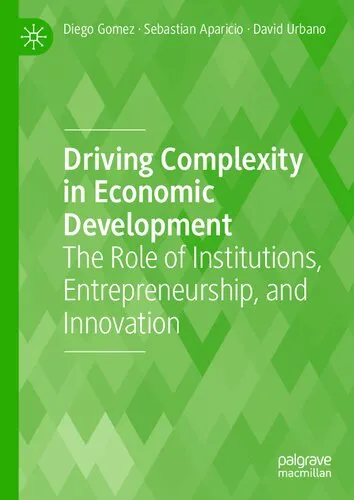Driving Complexity in Economic Development: The Role of Institutions, Entrepreneurship, and Innovation
4.0
بر اساس نظر کاربران

شما میتونید سوالاتتون در باره کتاب رو از هوش مصنوعیش بعد از ورود بپرسید
هر دانلود یا پرسش از هوش مصنوعی 2 امتیاز لازم دارد، برای بدست آوردن امتیاز رایگان، به صفحه ی راهنمای امتیازات سر بزنید و یک سری کار ارزشمند انجام بدینکتاب های مرتبط:
معرفی کتاب
کتاب Driving Complexity in Economic Development: The Role of Institutions, Entrepreneurship, and Innovation اثری منحصربهفرد در حوزه توسعه اقتصادی است که توسط دیگو گومز، سباستین آپاریسیو و دیوید اوربانو نوشته شده است. این کتاب بهطور عمیقی به پیچیدگیهای توسعه اقتصادی از منظر نوآوری، Entrepreneurship و تأثیر نهادها بر این فرایند میپردازد. نویسندگان در این اثر تلاش کردهاند با بهرهگیری از نظریات علمی پیشرفته و تحقیقات جامع، چارچوبی کاربردی برای درک چگونگی تعامل میان این عناصر کلیدی ارائه دهند.
هدف اصلی این کتاب تحلیل و تشریح این امر است که چرا برخی کشورها در مسیر توسعه اقتصادی موفق هستند، در حالی که دیگر کشورها به دلیل ناکارآمدیهای نهادی، کمبود نوآوری یا نبود Entrepreneurship مناسب، با چالشهای جدی مواجه هستند. نویسندگان با رویکردی چندبعدی و میانرشتهای، پیچیدگی سیستمهای اقتصادی مدرن را بررسی کرده و روابط متقابل و اثرپذیری سه مؤلفه اصلی را تحلیل میکنند.
خلاصهای مفصل از کتاب
کتاب به سه بخش اصلی تقسیم میشود. در بخش اول، نقش نهادها یا همان Institutions در تعیین مسیر توسعه اقتصادی بررسی شده است. نویسندگان با ارائه مثالهای جهانی نشان میدهند که نهادهای قوی و کارآمد میتوانند شرایط لازم برای رشد اقتصادی را ایجاد کنند، در حالی که نهادهای ضعیف معمولاً مانع پیشرفت میشوند.
بخش دوم به موضوع Entrepreneurship میپردازد. نویسندگان توضیح میدهند که چگونه کارآفرینی بهعنوان موتور رشد اقتصادی عمل میکند و نوآوری و ایجاد کسبوکارهای جدید میتواند به توسعه اقتصادی تمامعیاری منجر شود. آنها همچنین تأثیر فساد، قوانین محدودکننده و سیاستهای ناکارآمد را بر Entrepreneurship مورد بررسی قرار دادهاند.
بخش سوم و پایانی بر اهمیت نوآوری (Innovation) متمرکز است. نوآوری، عامل کلیدی رقابت در اقتصاد جهانی امروز به شمار میرود و کتاب با تأکید بر دادهها و مطالعات موردی، اثر آن را در تحول اقتصادی شرح میدهد. نویسندگان در این بخش، ارتباط میان نوآوری، نهادها و Entrepreneurship را بهخوبی توضیح میدهند.
نکات کلیدی
- نهادهای قوی پایه و اساس توسعه اقتصادی پایدار هستند.
- کارآفرینی نهتنها باعث خلق ثروت میشود بلکه به تقویت نوآوریها و تکنولوژیهای نوین کمک میکند.
- نوآوری میتواند بهعنوان یک عامل محرک اقتصادی، رقابت جهانی را افزایش داده و فرصتهای جدید ایجاد کند.
- تعامل میان نهادها، Entrepreneurship و نوآوری نقش کلیدی در حل مسائل پیچیده اقتصادی دارد.
نقلقولهای مشهور از کتاب
«اقتصادهایی که به پیچیدگیهای نهادی و نقش Entrepreneurship توجه نمیکنند، محکوم به درجا زدن هستند.»
«نوآوری نیروی محرکه اقتصاد مدرن است، اما بدون حمایت نهادی و سیاستگذاری اصولی، در مسیر توسعه اقتصادی شکست خواهد خورد.»
«همکاری میان کارآفرینان، سیاستگذاران و جامعه علمی، رمز موفقیت اقتصادی در قرن بیست و یکم است.»
چرا این کتاب اهمیت دارد؟
این کتاب نهتنها برای دانشجویان و پژوهشگران حوزه اقتصاد و مدیریت مفید است، بلکه برای سیاستگذاران و تصمیمگیران نیز راهنمایی ارزشمند محسوب میشود. با توجه به چالشهای اقتصادی جهانی و افزایش رقابت، درک عوامل مؤثر بر توسعه اقتصادی یک ضرورت است. کتاب «Driving Complexity in Economic Development» با ارائه بینشی جامع و مبتنی بر علم، به خوانندگان کمک میکند تا مسائل پیچیده اقتصادی را به شکلی ساختاریافته و تحلیلی درک کنند.
علاوه بر این، این کتاب برای کارآفرینانی که قصد ایجاد تغییرات مثبت در جامعه خود دارند، ابزارها و راهنماییهای کاربردی ارائه میدهد. اهمیت این اثر در این است که نگاهی چندجانبه به مفهوم توسعه اقتصادی داشته و نهتنها به تئوریها، بلکه به شیوههای عملی نیز میپردازد.
Introduction to "Driving Complexity in Economic Development: The Role of Institutions, Entrepreneurship, and Innovation"
Economic development is a multifaceted phenomenon shaped by a delicate interplay of factors like institutions, entrepreneurship, and innovation. In "Driving Complexity in Economic Development: The Role of Institutions, Entrepreneurship, and Innovation," we delve deep into the intricate mechanisms that underpin economic growth and societal progress. By examining the role of entrepreneurial dynamics, institutional evolution, and technological advancements in fostering development, this book provides a robust framework for understanding the complexity of modern economies.
This volume reaches beyond simplistic development paradigms, presenting a holistic approach to driving meaningful change in emerging and advanced economies alike. Combining theoretical insights with practical examples, the book is a valuable resource for policymakers, entrepreneurs, academics, and anyone eager to understand the forces shaping sustainable economic development. It illustrates how interconnected systems of institutions, innovation, and entrepreneurship operate as key drivers in building resilient economies and inclusive societies.
A Detailed Summary of the Book
The book is divided into several key sections, each addressing core elements integral to navigating the complexity of economic growth. It begins with an exploration of institutional frameworks, highlighting the critical role of governance, property rights, and legal systems in laying the foundation for entrepreneurial activity and innovation. Institutions are portrayed as the stabilizing bedrock, fostering trust, reducing transaction costs, and enabling entrepreneurial ecosystems to thrive.
The second section delves into entrepreneurship as a catalyst for change. Entrepreneurs, viewed as agents of economic dynamism, leverage institutional support to introduce innovations, disrupt markets, and create new industries. This segment examines various entrepreneurial archetypes, such as necessity-based and opportunity-driven entrepreneurs, emphasizing their unique contributions to economic development.
The third part of the book explores the transformative power of innovation. By integrating theoretical frameworks with data-driven analysis, readers are presented with evidence of how technological breakthroughs—ranging from digital communication to green technologies—spur productivity and foster sustainable growth. Innovation is framed as a collective process rooted in creativity, experimentation, and collaboration at multiple levels of society.
Lastly, the book synthesizes these themes to provide actionable recommendations for fostering inclusive and sustainable development. The closing chapters advocate for a systems approach where institutions, entrepreneurship, and innovation co-evolve in an iterative cycle, reinforcing each other over time to generate long-term prosperity and resilience.
Key Takeaways
- Institutions serve as the backbone of economic systems, influencing the paths economies take to evolve and grow.
- Entrepreneurship is not only about creating businesses but also about inspiring structural and systemic change in economies.
- Innovation is a multifaceted process that requires cross-sectoral collaboration and robust policy frameworks to be sustainable.
- Developing economies benefit from adaptive strategies that align institutional reforms with entrepreneurial capabilities and innovative practices.
- Economic development is a complex, iterative process that demands continuous experimentation and learning.
Famous Quotes from the Book
"Economic growth is not a linear process; it is a cascading reaction where institutions, entrepreneurship, and innovation persistently interact."
"The true measure of progress lies not merely in wealth accumulation but in building a society that fosters inclusivity, resilience, and sustainable growth."
"Entrepreneurship is more than a business endeavor; it is a societal force that redefines what's possible and challenges the limits of our imagination."
Why This Book Matters
As the global economic landscape grows increasingly interconnected and complex, understanding the key drivers of development becomes essential. "Driving Complexity in Economic Development" offers an integrated perspective that equips stakeholders with the tools and insights needed to navigate this complexity. The book's interdisciplinary approach reveals how the synergy between institutions, entrepreneurship, and innovation creates a self-reinforcing loop vital for sustained progress.
By targeting both the theoretical underpinnings and practical applications of economic growth models, this volume bridges the gap between academic research and real-world policy-making. The insights shared herein are as relevant to emerging markets grappling with institutional challenges as they are to advanced economies striving to maintain competitive advantages. The book challenges conventional wisdom and encourages readers to think critically about the role they play in fostering economic transformation.
More than a scholarly work, this book is a call to action—a reminder that sustainable development is achievable only when we embrace change, nurture innovation, and empower individuals to drive meaningful impact within their communities and beyond.
دانلود رایگان مستقیم
You Can Download this book after Login
دسترسی به کتابها از طریق پلتفرمهای قانونی و کتابخانههای عمومی نه تنها از حقوق نویسندگان و ناشران حمایت میکند، بلکه به پایداری فرهنگ کتابخوانی نیز کمک میرساند. پیش از دانلود، لحظهای به بررسی این گزینهها فکر کنید.
این کتاب رو در پلتفرم های دیگه ببینید
WorldCat به شما کمک میکنه تا کتاب ها رو در کتابخانه های سراسر دنیا پیدا کنید
امتیازها، نظرات تخصصی و صحبت ها درباره کتاب را در Goodreads ببینید
کتابهای کمیاب یا دست دوم را در AbeBooks پیدا کنید و بخرید
1202
بازدید4.0
امتیاز50
نظر98%
رضایتنظرات:
4.0
بر اساس 0 نظر کاربران
"کیفیت چاپ عالی بود، خیلی راضیام"



